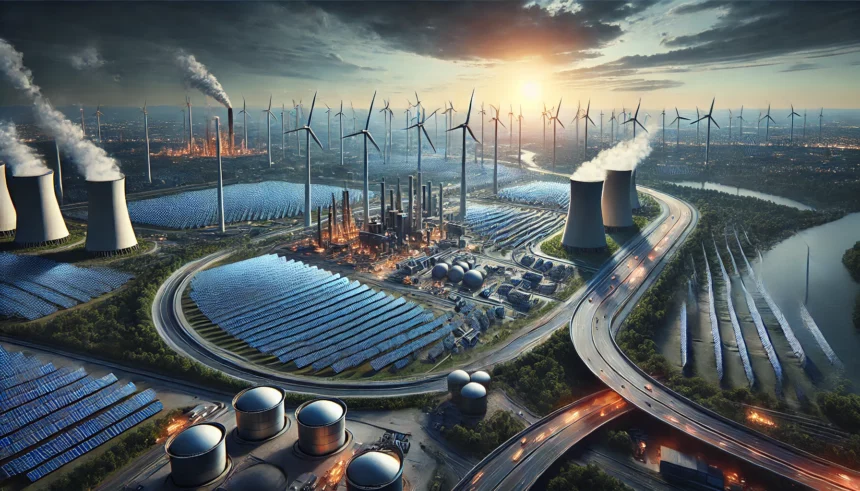Germany has set a new record for renewable energy generation in the first half of 2024, according to a report by the Fraunhofer Institute for Solar Energy Systems (ISE).
Contents
Key Highlights:
- Renewable Share: 65% of Germany’s net public electricity generation came from renewable sources between January and June.
- Decline in Fossil Fuels: Fossil fuel generation and electricity prices saw a decline during the same period.
Breakdown of Renewable Energy Sources:
- Solar Power:
- Generated 32.4 TWh, marking a 15% increase from the same period in 2023.
- 5 GW of new solar capacity was added from January through April, reaching 6.2 GW by the end of May.
- Solar capacity is on track to hit over 88 GW by the end of 2024, with an expected annual increase of 22 GW from 2026.
- Wind Power:
- Generated 73.4 TWh, making up 34.1% of the total net public electricity generation.
- However, wind power expansion remains weak, with only 1 GW of new capacity added in the first half of the year.
- Other Renewables:
- Including hydropower and biomass, renewable sources collectively generated 140 TWh, a new record.
Impact on Electricity Prices:
- Electricity prices fell sharply from €100.54/MWh to €67.94/MWh, a trend seen across Europe as the effects of the Ukraine invasion in 2022 diminish.
Growth in Energy Storage:
- Energy storage capacity expanded significantly, with systems providing an output of 1.8 GW and a capacity of 2.5 GWh connected to the grid in the first half of the year. This is crucial for balancing renewable electricity generation throughout the day.
Trends and Predictions:
- Solar Energy:
- Expected to become the leading source of new clean power capacity in the EU this year, driven largely by Germany.
- The Bundesverband Solarwirtschaft (BSW Solar) predicts continued strong growth in solar capacity.
- Fossil Fuels:
- The share of fossil fuel generation dropped from 39.6% to 35.0%.
- Since 2015, renewable electricity generation has risen by 56%, while fossil fuel generation has decreased by 46%.
Germany’s ongoing energy transition is evident in these numbers, showcasing a significant shift towards a more sustainable energy future. The country’s commitment to expanding renewable energy sources and reducing reliance on fossil fuels is paving the way for a greener, more efficient energy landscape.
This record-setting period marks an important milestone in Germany’s energy journey, highlighting both the progress made and the potential for future growth in renewable energy.
















